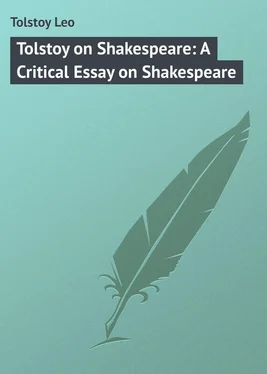Leo Tolstoy - Tolstoy on Shakespeare - A Critical Essay on Shakespeare
Здесь есть возможность читать онлайн «Leo Tolstoy - Tolstoy on Shakespeare - A Critical Essay on Shakespeare» — ознакомительный отрывок электронной книги совершенно бесплатно, а после прочтения отрывка купить полную версию. В некоторых случаях можно слушать аудио, скачать через торрент в формате fb2 и присутствует краткое содержание. Жанр: Русская классическая проза, foreign_language, на английском языке. Описание произведения, (предисловие) а так же отзывы посетителей доступны на портале библиотеки ЛибКат.
- Название:Tolstoy on Shakespeare: A Critical Essay on Shakespeare
- Автор:
- Жанр:
- Год:неизвестен
- ISBN:нет данных
- Рейтинг книги:5 / 5. Голосов: 1
-
Избранное:Добавить в избранное
- Отзывы:
-
Ваша оценка:
- 100
- 1
- 2
- 3
- 4
- 5
Tolstoy on Shakespeare: A Critical Essay on Shakespeare: краткое содержание, описание и аннотация
Предлагаем к чтению аннотацию, описание, краткое содержание или предисловие (зависит от того, что написал сам автор книги «Tolstoy on Shakespeare: A Critical Essay on Shakespeare»). Если вы не нашли необходимую информацию о книге — напишите в комментариях, мы постараемся отыскать её.
Tolstoy on Shakespeare: A Critical Essay on Shakespeare — читать онлайн ознакомительный отрывок
Ниже представлен текст книги, разбитый по страницам. Система сохранения места последней прочитанной страницы, позволяет с удобством читать онлайн бесплатно книгу «Tolstoy on Shakespeare: A Critical Essay on Shakespeare», без необходимости каждый раз заново искать на чём Вы остановились. Поставьте закладку, и сможете в любой момент перейти на страницу, на которой закончили чтение.
Интервал:
Закладка:
In this fourth act, the scene between Lear and his daughter might have been touching if it had not been preceded in the course of the earlier acts by the tediously drawn out, monotonous ravings of Lear, and if, moreover, this expression of his feelings constituted the last scene. But the scene is not the last.
In the fifth act, the former coldly pompous, artificial ravings of Lear go on again, destroying the impression which the previous scene might have produced.
The first scene of the fifth act at first represents Edmund and Regan; the latter is jealous of her sister and makes an offer. Then come Goneril, her husband, and some soldiers. The Duke of Albany, altho pitying Lear, regards it as his duty to fight with the French who have invaded his country, and so he prepares for battle.
Then Edgar enters, still disguised, and hands to the Duke of Albany the letter he had received from Goneril's dying steward, and tells him if he gains the victory to sound the trumpet, saying that he can produce a champion who will confirm the contents of the letter.
In the second scene, Edgar enters leading his father Gloucester, seats him by a tree, and goes away himself. The noise of battle is heard, Edgar runs back and says that the battle is lost and Lear and Cordelia are prisoners. Gloucester again falls into despair. Edgar, still without disclosing himself to his father, counsels endurance, and Gloucester immediately agrees with him.
The third scene opens with a triumphal progress of the victor Edmund. Lear and Cordelia are prisoners. Lear, altho no longer insane, continues to utter the same senseless, inappropriate words, as, for example, that in prison he will sing with Cordelia, she will ask his blessing, and he will kneel down (this process of kneeling down is repeated three times) and will ask her forgiveness. And he further says that, while they are living in prison, they will wear out "packs and sects of great ones"; that he and Cordelia are sacrifices upon which the gods will throw incense, and that he that parts them "shall bring a brand from heaven and fire them like foxes; that he will not weep, and that the plague shall sooner devour his eyes, flesh and fell, than they shall make them weep."
Edmund orders Lear and his daughter to be led away to prison, and, having called the officer to do this, says he requires another duty and asks him whether he'll do it? The captain says he can not draw a cart nor eat dried oats, but if it be men's work he can do it. Enter the Duke of Albany, Goneril, and Regan. The Duke of Albany wishes to champion Lear, but Edmund does not allow it. The daughters take part in the dialog and begin to abuse each other, being jealous of Edmund. Here everything becomes so confused that it is difficult to follow the action. The Duke of Albany wishes to arrest Edmund, and tells Regan that Edmund has long ago entered into guilty relations with his wife, and that, therefore, Regan must give up her claims on Edmund, and if she wishes to marry, should marry him, the Duke of Albany.
Having said this, the Duke of Albany calls Edmund, orders the trumpet to be sounded, saying that, if no one appears, he will fight him himself.
Here Regan, whom Goneril has evidently poisoned, falls deadly sick. Trumpets are sounded and Edgar enters with a vizor concealing his face, and, without giving his name, challenges Edmund. Edgar abuses Edmund; Edmund throws all the abuses back on Edgar's head. They fight and Edmund falls. Goneril is in despair. The Duke of Albany shows Goneril her letter. Goneril departs.
The dying Edmund discovers that his opponent was his brother. Edgar raises his vizor and pronounces a moral lesson to the effect that, having begotten his illegitimate son Edmund, the father has paid for it with his eyesight. After this Edgar tells the Duke of Albany his adventures and how he has only just now, before entering on the recent combat, disclosed everything to his father, and the father could not bear it and died from emotion. Edmund is not yet dead, and wants to know all that has taken place.
Then Edgar relates that, while he was sitting over his father's body, a man came and closely embraced him, and, shouting as loudly as if he wished to burst heaven, threw himself on the body of Edgar's father, and told the most piteous tale about Lear and himself, and that while relating this the strings of life began to crack, but at this moment the trumpet sounded twice and Edgar left him "tranced" – and this was Kent.
Edgar has hardly finished this narrative when a gentleman rushes in with a bloody knife, shouting "Help!" In answer to the question, "Who is killed?" the gentleman says that Goneril has been killed, having poisoned her sister, she has confessed it.
Enters Kent, and at this moment the corpses of Goneril and Regan are brought in. Edmund here says that the sisters evidently loved him, as one has poisoned the other for his sake, and then slain herself. At the same time he confesses that he had given orders to kill Lear and to hang Cordelia in prison, and pretend that she had taken her own life; but now he wishes to prevent these deeds, and having said this he dies, and is carried away.
After this enters Lear with the dead Cordelia in his arms, altho he is more than eighty years old and ill. Again begins Lear's awful ravings, at which one feels ashamed as at unsuccessful jokes. Lear demands that all should howl, and, alternately, believes that Cordelia is dead and that she is alive.
"Had I your tongues and eyes," he says "I'd use them so that heaven's vault should crack."
Then he says that he killed the slave who hanged Cordelia. Next he says that his eyes see badly, but at the same time he recognizes Kent whom all along he had not recognized.
The Duke of Albany says that he will resign during the life of Lear and that he will reward Edgar and Kent and all who have been faithful to him. At this moment the news is brought that Edmund is dead, and Lear, continuing his ravings, begs that they will undo one of his buttons – the same request which he had made when roaming about the heath. He expresses his thanks for this, tells everyone to look at something, and thereupon dies.
In conclusion, the Duke of Albany, having survived the others, says:
"The weight of this sad time we must obey;
Speak what we feel, not what we ought to say.
The oldest hath borne most: we that are young
Shall never see so much, nor live so long."
All depart to the music of a dead march. Thus ends the fifth act and the drama.
III
Such is this celebrated drama. However absurd it may appear in my rendering (which I have endeavored to make as impartial as possible), I may confidently say that in the original it is yet more absurd. For any man of our time – if he were not under the hypnotic suggestion that this drama is the height of perfection – it would be enough to read it to its end (were he to have sufficient patience for this) to be convinced that far from being the height of perfection, it is a very bad, carelessly composed production, which, if it could have been of interest to a certain public at a certain time, can not evoke among us anything but aversion and weariness. Every reader of our time, who is free from the influence of suggestion, will also receive exactly the same impression from all the other extolled dramas of Shakespeare, not to mention the senseless, dramatized tales, "Pericles," "Twelfth Night," "The Tempest," "Cymbeline," "Troilus and Cressida."
Конец ознакомительного фрагмента.
Текст предоставлен ООО «ЛитРес».
Прочитайте эту книгу целиком, купив полную легальную версию на ЛитРес.
Читать дальшеИнтервал:
Закладка:
Похожие книги на «Tolstoy on Shakespeare: A Critical Essay on Shakespeare»
Представляем Вашему вниманию похожие книги на «Tolstoy on Shakespeare: A Critical Essay on Shakespeare» списком для выбора. Мы отобрали схожую по названию и смыслу литературу в надежде предоставить читателям больше вариантов отыскать новые, интересные, ещё непрочитанные произведения.
Обсуждение, отзывы о книге «Tolstoy on Shakespeare: A Critical Essay on Shakespeare» и просто собственные мнения читателей. Оставьте ваши комментарии, напишите, что Вы думаете о произведении, его смысле или главных героях. Укажите что конкретно понравилось, а что нет, и почему Вы так считаете.












